
Freshfel Europe Headlines – Edition 1, 2023
Freshfel Europe’s Headlines publication provides an overview of the Association’s most recent activities.
For more information about Freshfel Europe’s activities please contact the Freshfel Europe Secretariat.

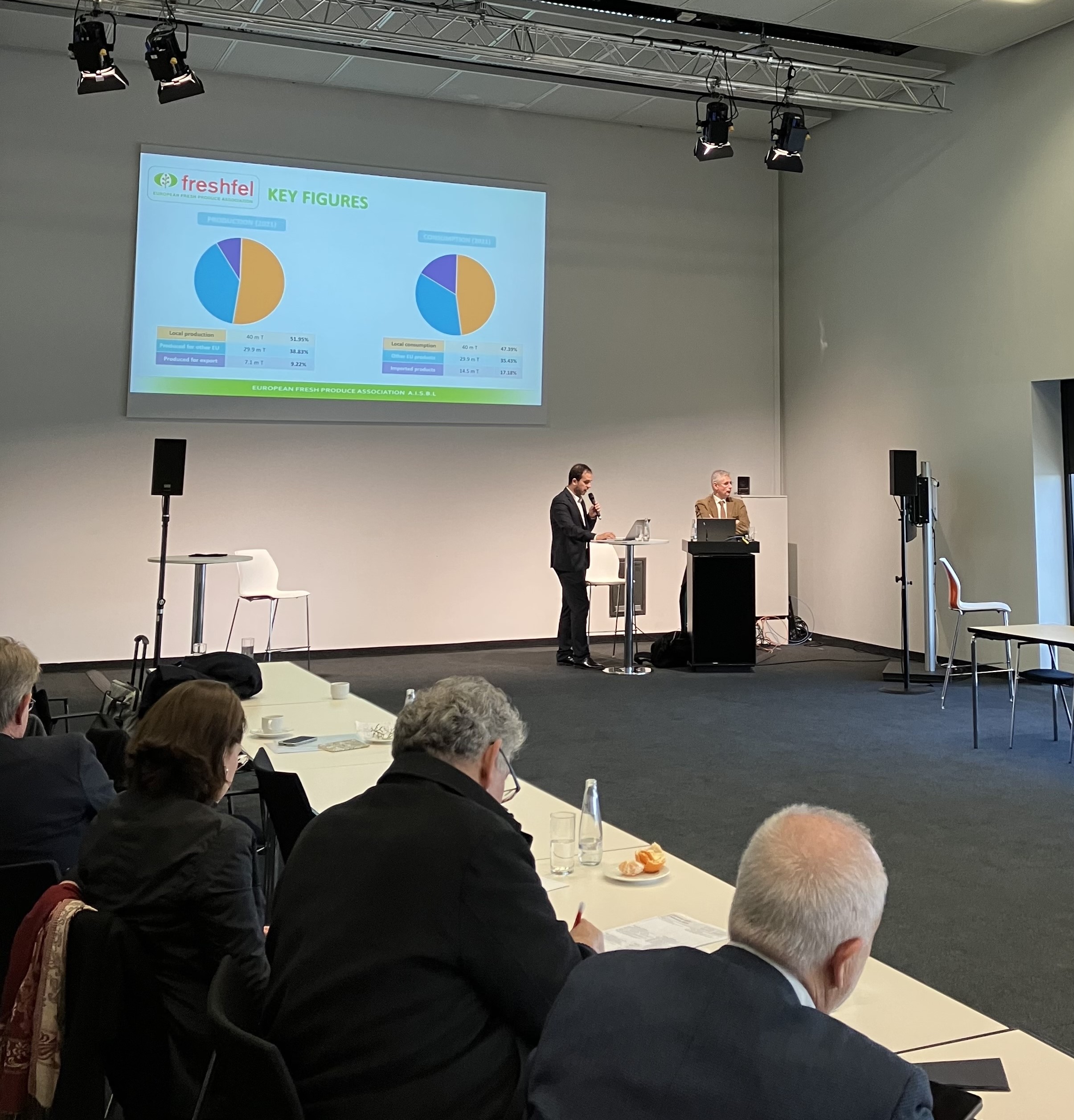
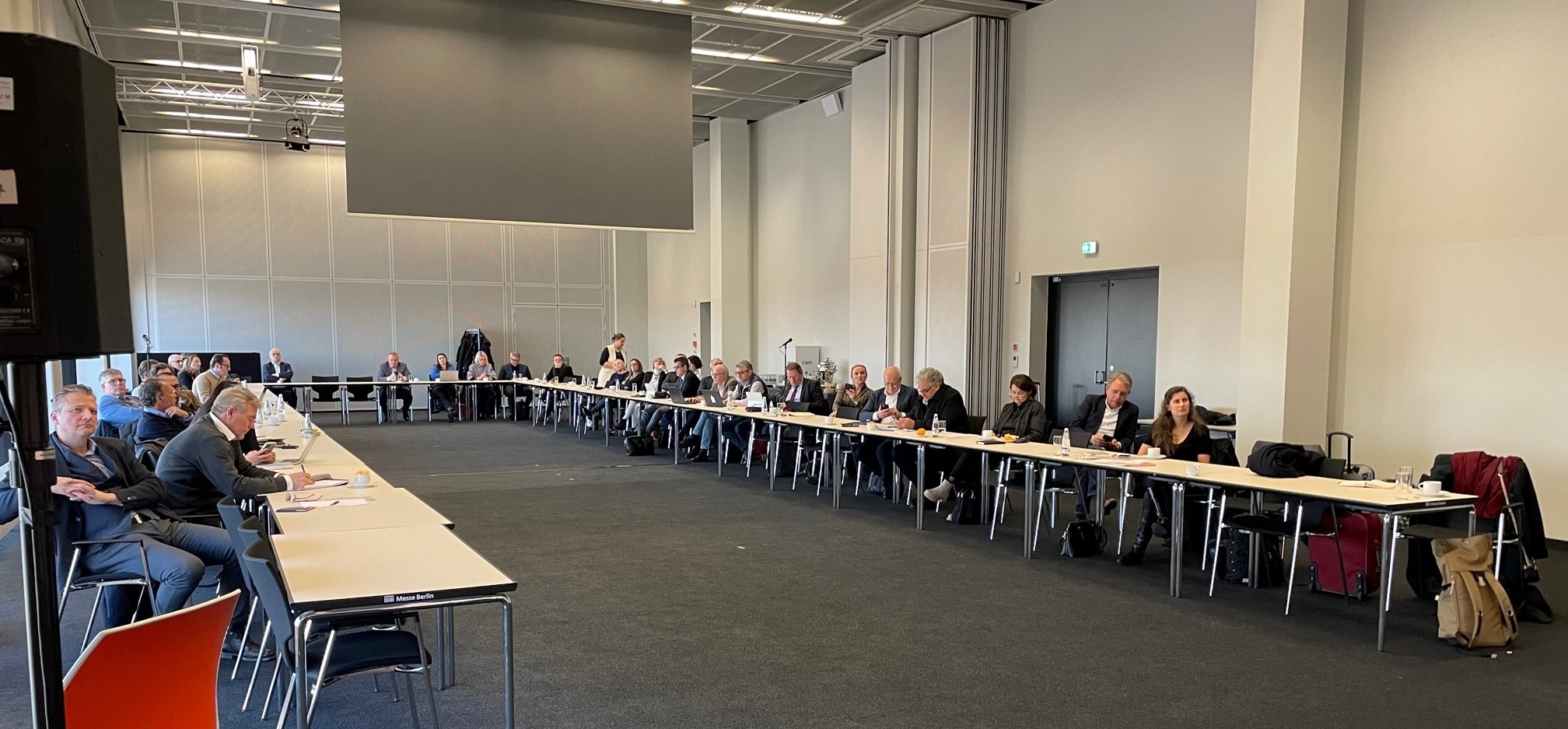
Freshfel Europe presents the latest trade trends for fresh produce for the 2016-22 period
On 7 February, ahead of the official launch of 2023’s Fruit Logistica in Berlin, Freshfel Europe organised a major event for members to showcase the latest figures and developments for the fresh produce trade within the EU and for imports and exports. Close to 70 members of the Association from across the chain and from services providers gathered to exchange on the latest trends.
Freshfel Europe highlighted the uneasy situation the sector faces due to the ongoing poly-crisis and detailed the leading factors behind the situation including rising costs, geopolitical tensions, climate change, the problematic supply situation resulting from the COVID pandemic, and the post-pandemic rebound. In response to these crises, the speakers showcased ongoing Freshfel Europe initiatives. These include positioning the sector as a central element for sustainability, food security and public health, the organisation of the Global Coalition of Fresh Produce, tasked with researching and producing reports and recommendations to address global issues the sector faces, as well as the Freshfel Environmental Footprint Initiative’s work developing a shadow PEFCR.
The most significant intra-EU, export and import trends for the 2016-2021 period, as well as the 2021-2022 period, were presented to members. Freshfel Europe indicated that the situation of intra-EU trade has remained stable, with an upward trend in terms of traded value and a positive outlook for 2022. Identified trends showed that Dutch and Polish shipments have increased over time, contrasting with the negative trends of French, Italian or Belgian produce. In terms of non-EU trade, Freshfel highlighted the growing trade deficit the sector faces, with growing import volumes paired with shrinking export ones. Other key features included the EU’s focus on exports to its immediate neighbourhood, mainly the UK and its dependence on imports from Central and South America, particularly for bananas.
Freshfel Europe additionally presented an overview of the sector’s current trade environment, including inflation-related challenges, extreme weather, and issues with bilateral protocols. The Secretariat also highlighted the current situation of free trade negotiations, the Brexit state-of-play, and challenges related to the EU’s Green Deal and its implementation through concrete rules in a flurry of areas, including packaging and transport. Food safety issues related to the past year’s RASFF notifications were illustrated in addition to an update on the ongoing work of the Freshfel Environmental Footprint Initiative.

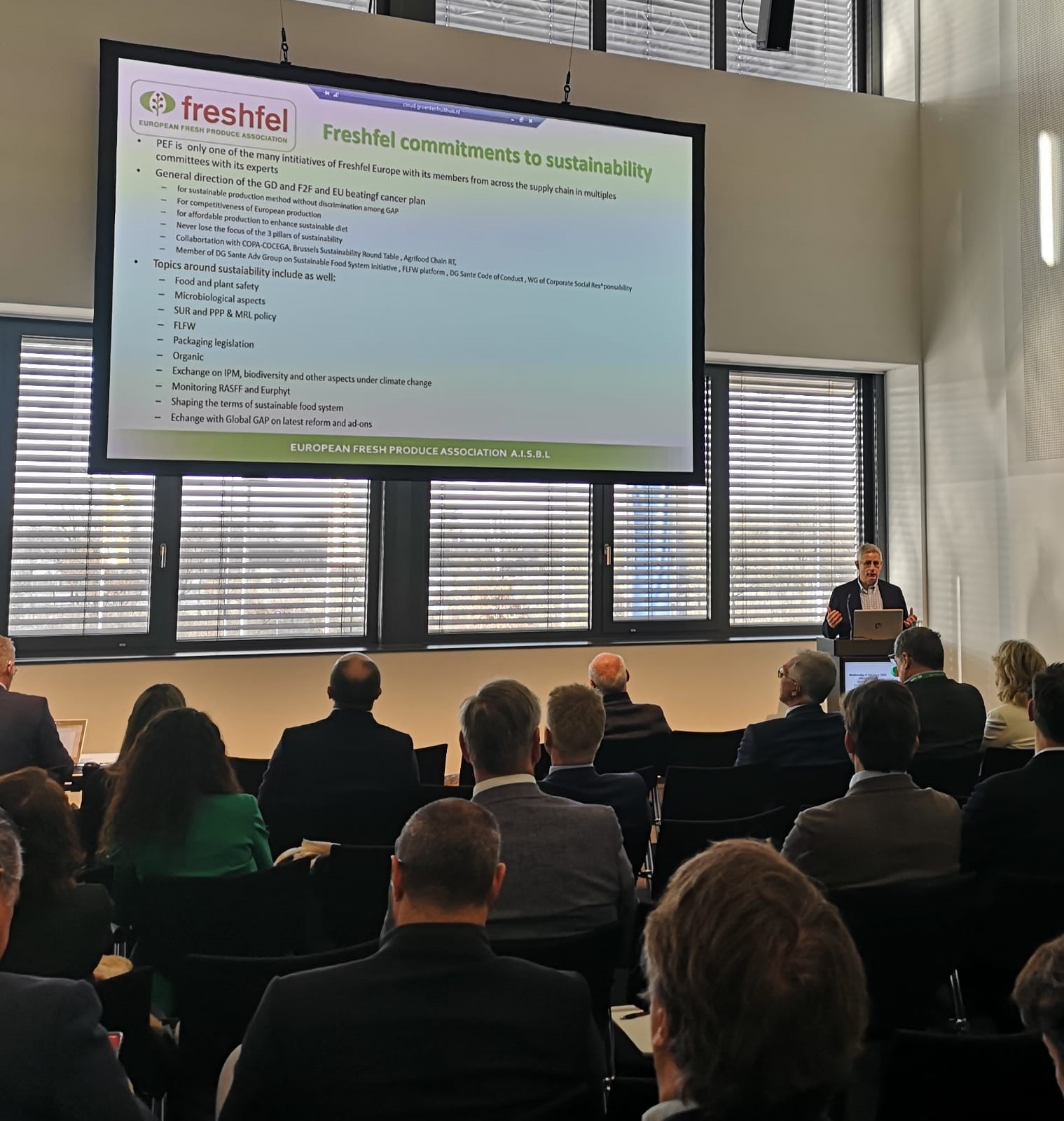
Freshfel Europe present the progress on its Environmental Footprint Initiative during Fruit Logistica
On the occasion of Fruit Logistica, Freshfel Europe reported to a group of European growers/suppliers and representatives of GlobalG.A.P. on the latest development within Freshfel Europe on sustainability and the progress regarding the Freshfel Environmental Footprint Initiative. The Initiative is driven by leading members of Freshfel Europe, including companies and major Associations from across Europe. Since the beginning of 2021 they have joined forces in a collaborative effort for the benefit of the sector to be facilitate sector accountability for environmental sustainability. The project aims at generating synergies and avoiding sector duplication of work and resources while creating a level playing field for the measurement of product environmental impact using state-of-the-art methodology endorsed by the European Commission.
Such an initiative is key to sector alignment with future European regulatory development and for efficient response to customers’ societal concerns to measure and communicate the life cycle of products. It will also become an essential asset in the future to secure access to finance as a subsidy under the CAP or from financial institutions for business development. The shadow PEFCR (Product Environmental Footprint Category Rules) for fresh produce being developed by the Initiative will be verifiable, comparable, and scientifically driven and avoid mistrust in markets, avoid confusion on the market and allow comparison between products. Importantly, the shadow PEFCR will also increase transparency both in the supply chain and to consumers on our product sustainability.
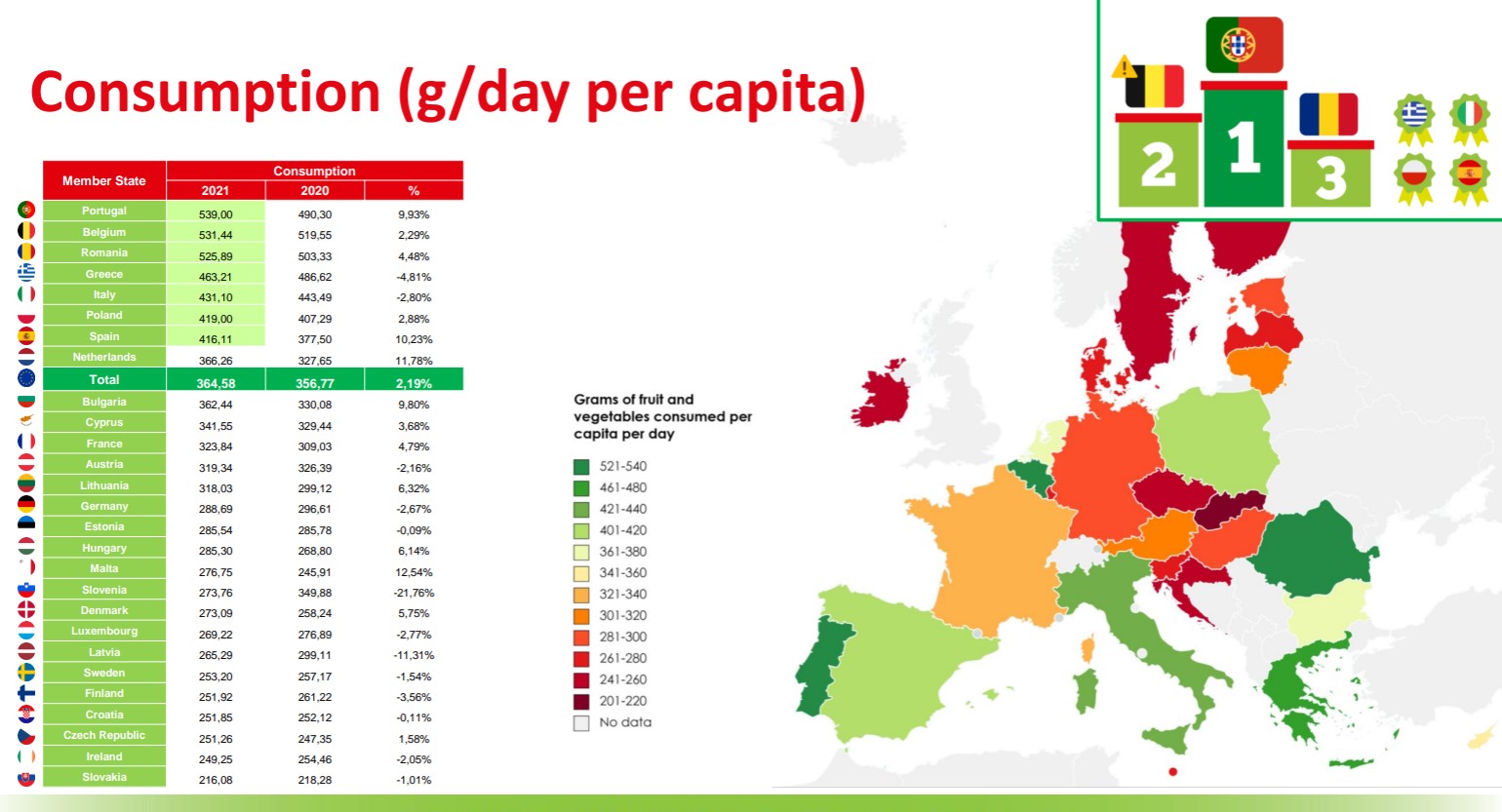
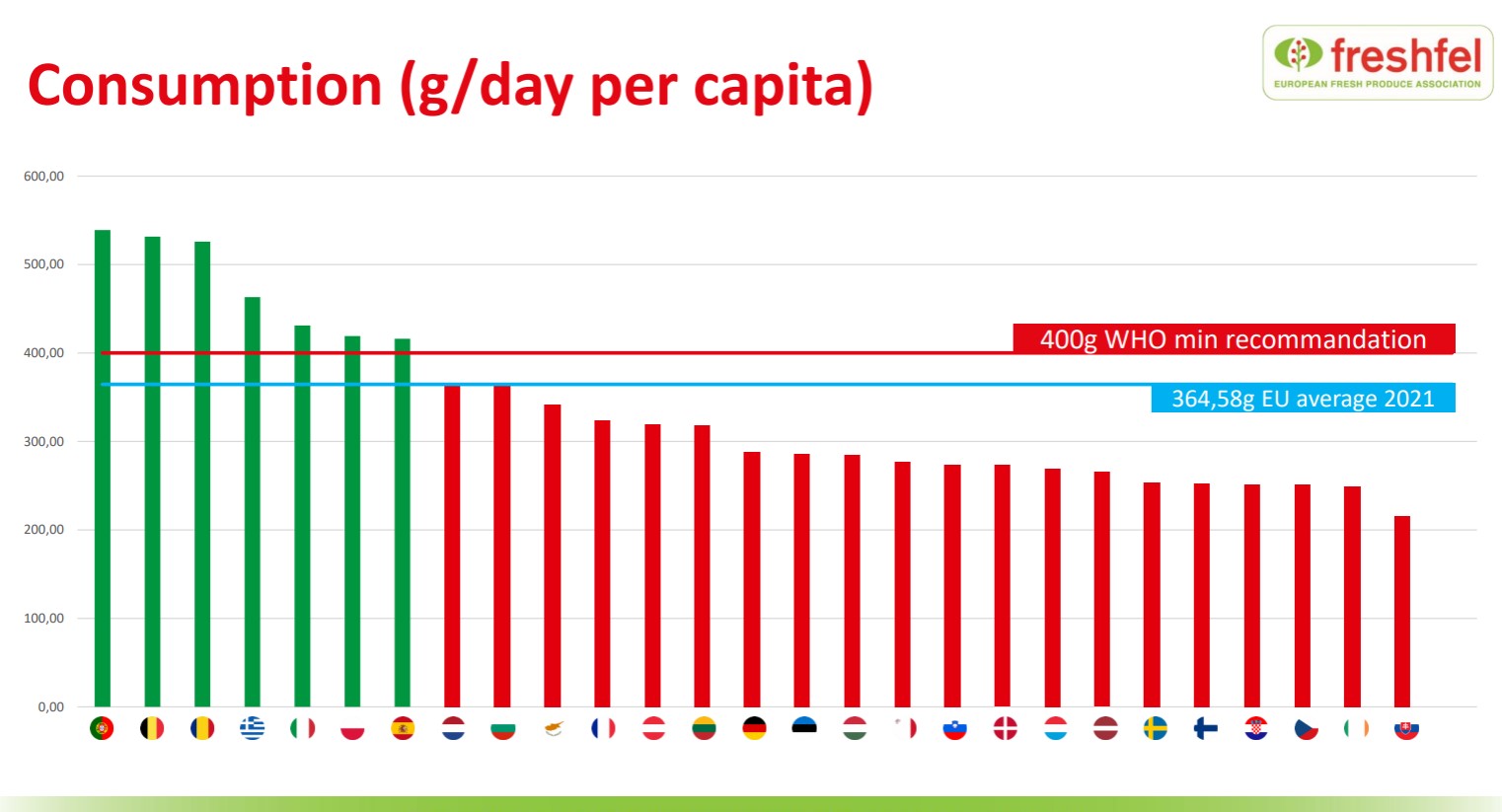
Preview of Freshfel Europe Consumption Monitor during webinar on consumption
During its recent webinar on fruit and vegetable consumption, Freshfel Europe shared a preview of its upcoming Consumption Monitor, which is slated to be published at the end of February. The preview showed that although fruit and vegetable consumption slightly increased during the COVID pandemic of 2020-2021, it is still under pressure in Europe and a further decline in consumption is expected in the 2022 figures. A vast majority of EU countries are still well below the daily 400g of fruit and vegetables recommended by the WHO (the 2021 EU average stood at 364,58g per day per capita). The overview of the figures between 2011 and 2021 also shows that no significant improvements have happened in the past decade, with the EU average still well under the target consumption figures.
During the webinar, guest speakers from EuroCommerce and BEUC joined to share both retail and consumer perspectives as well as ideas on how to increase the consumption of fresh fruits and vegetables in Europe. The sector also provided its input and presented data from some of the European markets. The sector acknowledges that even though consumers report being aware that a diet with fruits and vegetables is good not only good for their health but for environmental sustainability, their actual purchasing choices do not reflect this knowledge. There is a misconception of fruits and vegetables not being affordable, and when purchasing power comes under pressure households are prone to choose a more nutrient-dense, unhealthy diet. This is especially noticeable in the lowest-income households. From the meeting, it became clear that increased support and education of consumers is necessary to encourage more healthy and sustainable choices for both human, economic and environmental health. More information is available in the press release here.

Freshfel Europe calls for undisrupted promotion policy for fresh produce
As consumption of fresh fruit and vegetables is again under pressure, Freshfel Europe called on the European Commission on the occasion of the Info Days on Promotion on 1-2 February for a strong, continuous, and undisrupted promotion policy to stimulate consumption. The recent evolution of the interpretation of the EU promotion policy by the European Commission and its agency REA are indeed challenging the outreach and efficiency of the policy, putting at risk the European Commission’s own priorities, which aim to build multi-programmes focusing on fruit and vegetables or organic. The move of the Farm to Fork Strategy towards a healthy and plant diet is in jeopardy by the new evaluation criteria. It is challenging the much-needed continuity of the sector representative organisations, which permanently adapt their activities of information, marketing and promotion to evolving targets and needs to enhance consumption through generic promotion with the largest audiences.

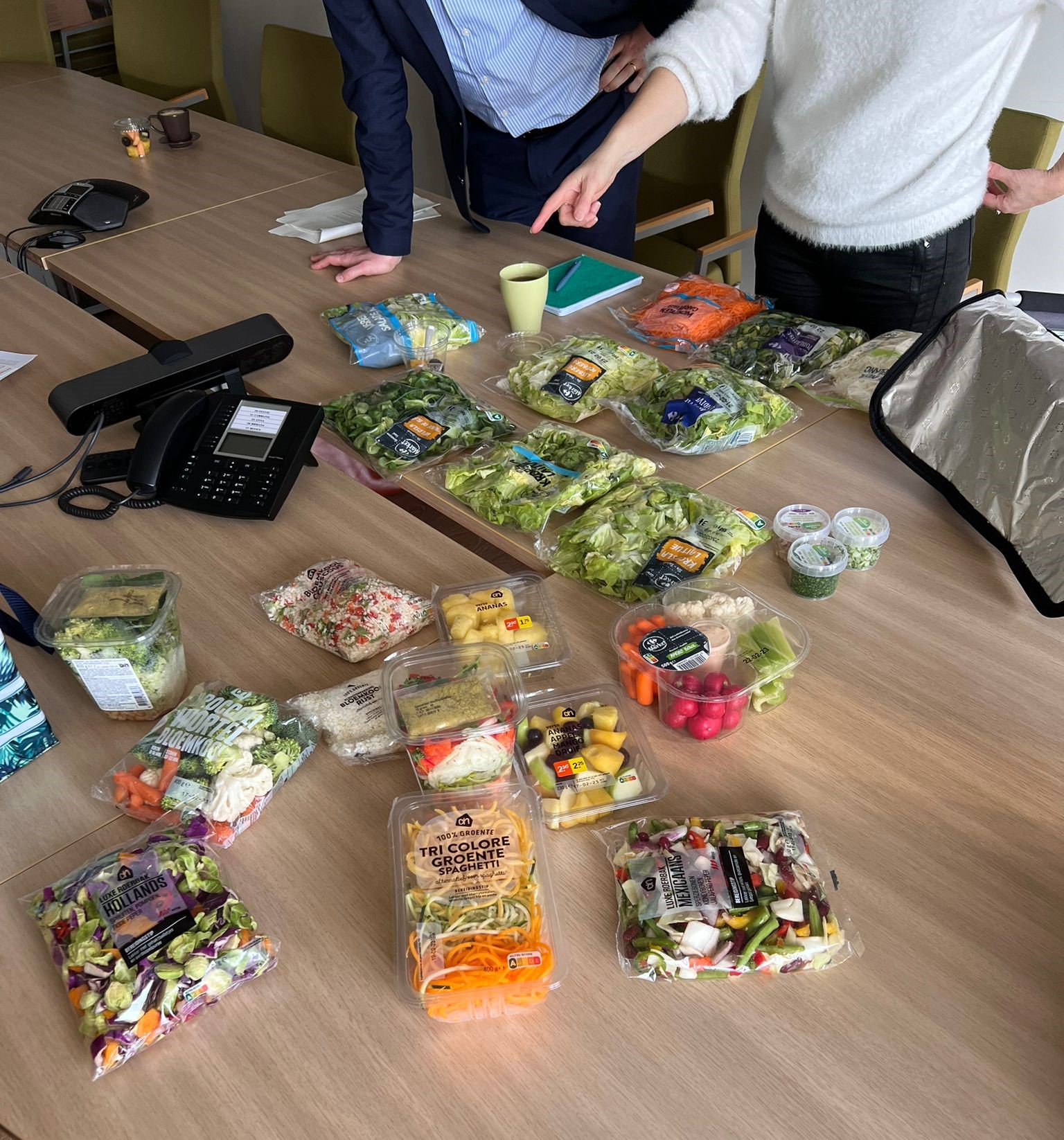
European Commission initiative on mandatory origin labeling for IV gamma products
In recent months Freshfel Europe and its members have been following discussions regarding the amendments to the marketing standard regulation of fresh fruit and vegetables. The European Commission is aiming to introduce a number of changes that would have a significant impact on fresh produce, especially on IV gamma products.
The European Commission is suggesting introducing mandatory origin labeling for all pre-cut produce. Currently, the text is still not finalized, and the European Commission will additionally launch a public stakeholder consultation in the upcoming month, to which the Association will respond. During discussions in recent months, Freshfel Europe has presented its opinion to the European Commission on various occasions. Such mandatory origin labeling for IV gamma products would have a substantial negative effect due to adjustments of operations at industrial processing facilities and consequently the effect on price for European consumers. Freshfel Europe stresses that any new policy initiatives should be evaluated from the point of view of other ongoing initiatives, such as food waste, packaging waste, healthy diets, etc. under the European Green Deal. Freshfel Europe will continue the constructive dialogue with the European Commission.

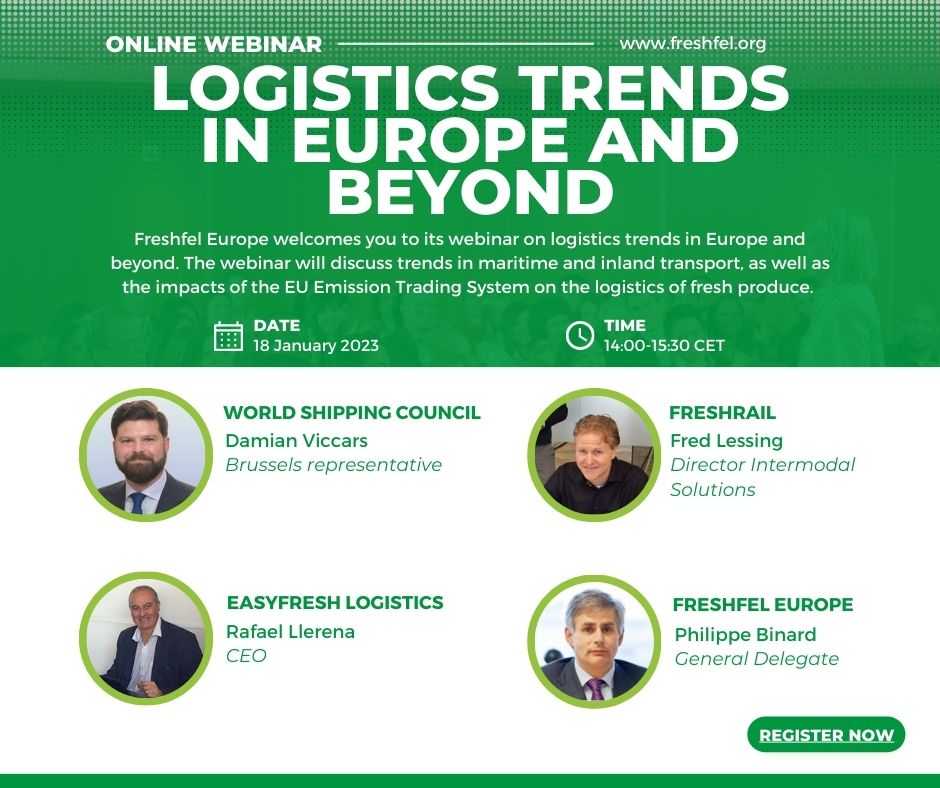
Freshfel Europe hosts webinar on logistics of fresh produce in Europe and beyond
Fresh produce logistics has been under high pressure in recent years with many bottlenecks and delays as well as substantial cost increases in both shipping and inland logistics. For this reason, Freshfel Europe organized a webinar on ‘Logistics in Europe and beyond’ on 18 January. Guest speakers from the World Shipping Council, Easyfresh Logistics and Freshrail shared their insights and knowledge on the situation for fresh produce logistics with members of Freshfel Europe, looking at past, current, and upcoming trends. The meeting showed that the surge in demand for reefers and cargo vessels that came with the boom of online shopping during COVID is declining. This has relieved bottlenecks, increased schedule reliability and turned the price curve. However, the past years have still affected the finances of many operators in a manner that will be noticeable for some time to come.
Looking ahead, the sector raised concerns not only about the costs but about the implications for various environmental goals and initiatives. As fresh produce his a highly perishable good, emissions-saving methods in shipping such as slow-steaming are not viable alternatives. Furthermore, the sector is preparing for the upcoming adoption of the revised EU ETS and CBAM, which will have an impact on the emissions of the maritime sector. The fresh produce industry calls for reliable and sustainable logistics for fresh fruits and vegetables. Transport networks, both inland and at sea, have to be optimized to create affordable, timely and well-connected multimodal solutions while continuing the journey towards decarbonisation. More information is available in the press release here.

Reviewing packaging legislation for upcoming consultations
Freshfel Europe, led by Director Sustainability & Communications Nicola Pisano, has been engaging with the European Commission DG ENVI and DG AGRI services regarding the European Commission’s proposal for a Regulation on packaging and packaging waste (PPWR) for some years. Freshfel Europe is consulting members across the fresh fruit and vegetable supply chain to respond to the latest European Commission consultation on the proposed Regulation. The current proposal targets the fresh produce sector with disproportionate and discriminatory measures in comparison to other food sectors, banning all single-use packaging for fresh fruit and vegetables. While the fresh fruit and vegetable sector supports moves towards more circular and sustainable supply chains, including packaging types and materials, efforts must be led through science-based solutions with true results as opposed to politically driven bans.
Freshfel Europe is also following fresh produce packaging developments at the national level across the Union in support of sustainable and circular solutions to continue the delivery of fresh fruit and vegetables to consumers to support healthy and sustainable diets. In the upcoming month, Freshfel Europe under the guidance of Ms Pisano will be responding to two TRIS Notifications for changes in Belgian and French packaging laws. The fresh produce sector strongly supports the harmonisation of packaging legislation at the EU level to facilitate operational sustainability both on an environmental and economic basis. Divergent Member State legislation, which has emerged since the implementation of the Single-use Plastics Directive, has hindered sector sustainability efforts. The fresh produce sector is looking towards EU harmonisation of rules through the PPWR to better support enhanced sustainability throughout the supply chain.
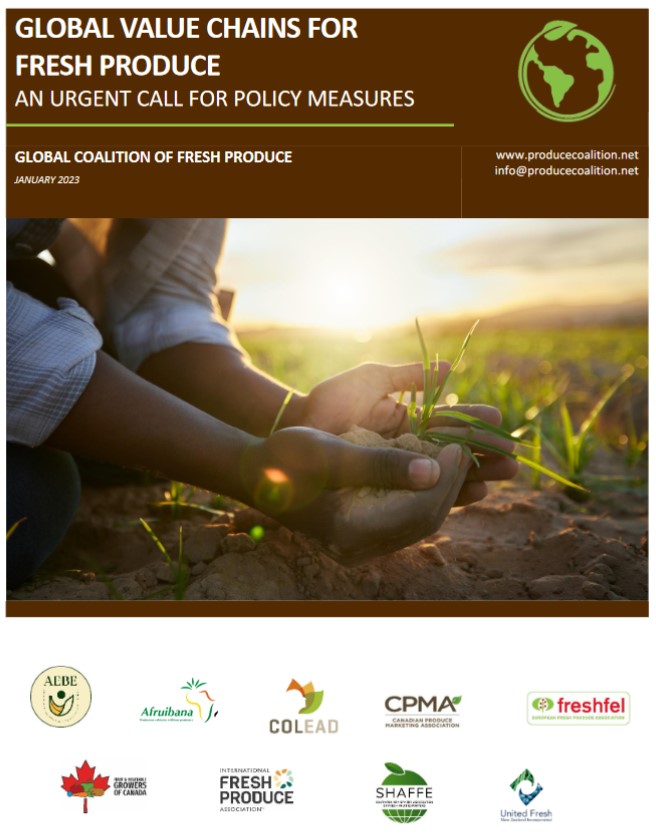
The Global Coalition of Fresh Produce, supported by Freshfel Europe, on global fruit and vegetables value chains
In January, The Global Coalition of Fresh Produce (the Global Coalition) released a report, entitled ‘Global Value Chains for Fresh Produce: An Urgent Call for Policy Measures’, which analyses the current global trading environment for fresh fruits and vegetables. The report argues that fruits and vegetables are a critical element of the shift towards healthy and sustainable diets, as well as an engine of economic growth and job creation the world over. However, a number of challenges are currently threatening the long-term economic viability of the fresh produce sector worldwide, and thereby economic stability, food security and health. These challenges include substantial increases in costs, inefficiencies and delays in transportation, labour shortages, dwindling consumer purchasing power and obstacles to international trade, among other factors. Following the publication of the report, the Global Coalition has been approached by and engaged with, several international organisations to continue this work and create tangible and practical positive outcomes for the benefit of resilient fruits and vegetable supply chains, environmental stability, and global health.
The Global Coalition is a coalition of 10 fresh produce associations, including Freshfel Europe, from across the globe, bringing together views from six continents to create resilient global value chains for fresh fruits and vegetables. The Coalition’s mission is to voice solutions to address disruptions in global supply chains for fresh produce, increase attention and recognition of fruits and vegetables as strategic goods and share and promote best practices.
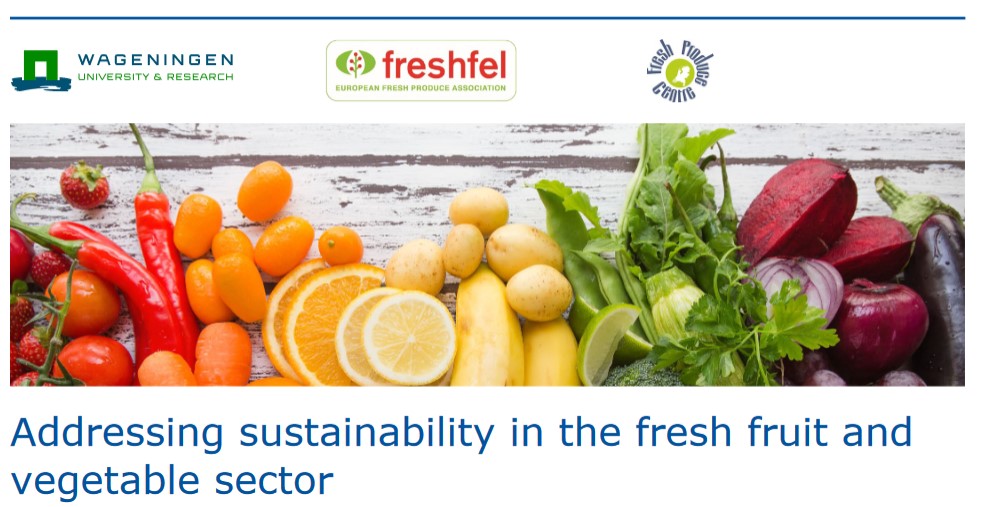
Freshfel Environmental Footprint Initiative begins work on shadow PEFCR for fruit and vegetables
In January, Freshfel Europe alongside members began work on the development of a shadow Product Environmental Footprint Category Rules (PEFCR) for fruit and vegetables. The work is a key pillar of the work of the Freshfel Environmental Footprint Initiative, whose objective is to develop a state-of-the-art, standardized environmental footprint methodology for the fresh produce sector. Once developed, the shadow PEFCR will enhance benchmarking and comparison of the environmental footprint of products within the fresh produce category. This will heighten sector transparency, accountability and communication on environmental matters with fruit and vegetables being one of the most sustainable food categories.
The PEFCR for fresh produce is being developed with the technical support of Wageningen Economic Research and will revise the existing HortiFootprint Category Rules for the fresh produce sector. The PEF methodology specific to the fresh produce sector will standardize environmental footprint methodology for sector calculations, facilitating higher transparency and accountability on environmental matters. The development of a shadow PEFCR with specific category rules for fruit and vegetables will ensure comparable results of PEF calculations. The harmonized methodology will also support sector communication on the strong positive environmental assets of fresh produce consumption, with fruit and vegetables being one of the most sustainable food categories.
During its development until the end of 2024, the shadow PEFCR will be open twice for public consultation. Its development will closely follow the European Commission’s official PEFCR process to be well aligned for future approval as the EU sector standard PEF methodology. An explanatory fact sheet on the shadow PEFCR for fruit and vegetables, entitled ‘Addressing sustainability in the fresh produce sector’ is available for download from Wageningen Economic Research here. More information about the activities of the Freshfel Environmental Footprint Initiative is available here.


FruitNet interviews Freshfel Europe ahead of Fruit Logistica
Freshfel Europe General Delegate Philippe Binard gave an in-depth interview in the third episode of FruitNet’s multimedia series “World of Fresh Ideas”. The show generally brings forward international experts, the latest trends and innovations in the fruit industry, and covers everything from production, packaging, transport and logistics. In the interview, Mr Binard commented on the current state of the business, and what the challenges of inflation, climate change and energy supply have meant for the sector. Looking forward, Mr Binard answered questions on how fresh produce companies can overcome the major challenges they face right now, as well as insight into what might still lie ahead.

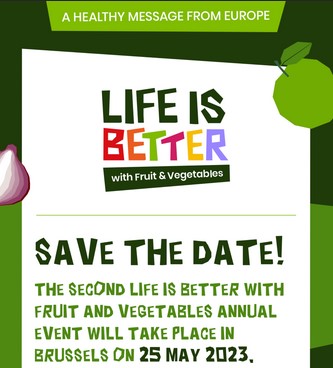
Preparations underway for the second Life is better with Fruit and Vegetables event on 25 May 2023
Preparations for the second press conference of the ‘Life is Better with Fruit and Vegetables’ campaign are in full swing. The event is scheduled to take place on 25 May 2023 in Brussels, following the successful opening press conference of the project last year. The venue and programme of the event will be announced soon.
The event’s first edition saw the participation of more than 100 representatives and journalists from the agricultural sector, with market analyses and testimonials from Millennial influencers regarding the eating habits of European Millennials. The 2023 event will focus on the challenges of the agricultural sector to keep fruit and vegetables accessible to consumers, starting from the results of Year 1 of the campaign. You can expect all of this and many more surprises in 2023 – stay tuned for all the developments! In the meantime, all the project materials are available on the website of Life is Better with Fruit and Vegetables, with a dedicated webpage for each of the target countries of the campaign (France and Ireland, in addition to Germany, Italy, Poland, and Spain).
